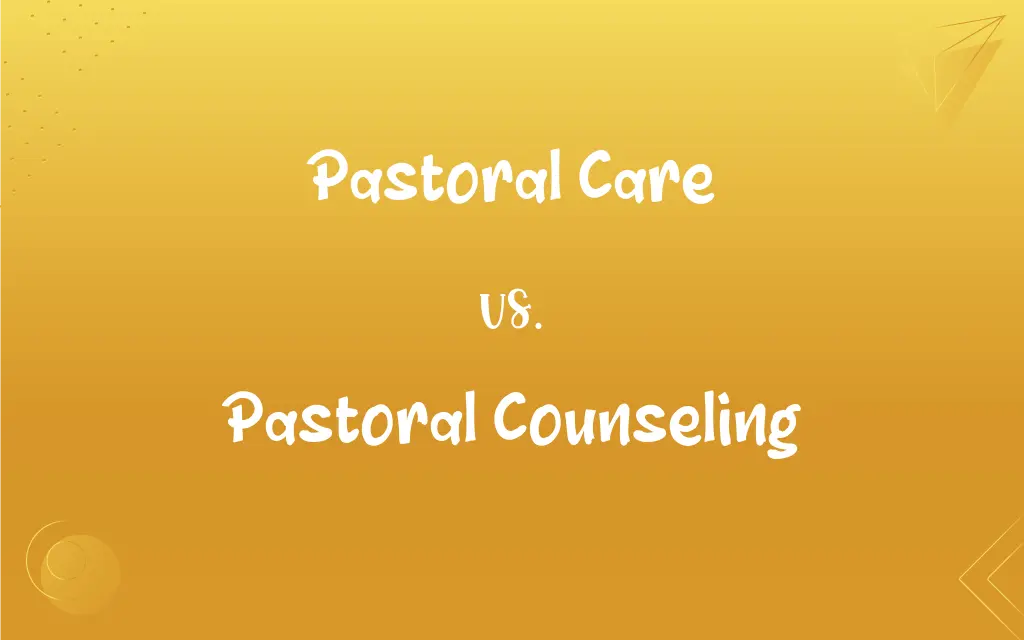Pastoral Care vs. Pastoral Counseling: What's the Difference?
By Aimie Carlson & Janet White || Published on March 31, 2024
Pastoral care provides general spiritual support and guidance, while pastoral counseling offers targeted psychological help within a spiritual framework.

Key Differences
Pastoral care encompasses a broad range of spiritual support services aimed at addressing the general well-being of individuals or communities. It is often provided by religious leaders and focuses on guidance, comfort, and practical assistance. Pastoral counseling, however, delves deeper into personal issues, combining therapeutic techniques with spiritual insights to address specific psychological problems.
Pastoral care is a universal aspect of religious leadership, offering support through life's challenges, pastoral counseling requires additional training in psychological counseling methods. This specialization enables pastoral counselors to integrate religious faith with psychological understanding in their practice.
Pastoral care might involve activities such as visiting the sick, offering prayer, and providing support during life events. In contrast, pastoral counseling engages individuals in a more formal, often private setting to work through personal, emotional, or spiritual crises, employing counseling theories and techniques alongside spiritual teachings.
The goal of pastoral care is to nurture spiritual health and provide comfort, often through a community-based approach. Pastoral counseling, however, aims to achieve psychological healing and growth, focusing on the individual's mental and emotional needs within the context of their faith.
Despite their differences, both pastoral care and pastoral counseling are rooted in the belief that spiritual well-being is integral to overall health. They serve complementary roles within religious communities, ensuring members receive both general spiritual support and specialized psychological care.
ADVERTISEMENT
Comparison Chart
Purpose
To provide spiritual support and guidance.
To offer psychological help within a spiritual framework.
Approach
General, community-focused.
Individual, therapy-focused.
Activities
Visiting the sick, prayer, life event support.
Formal counseling sessions, mental health support.
Training Required
Basic theological and spiritual leadership training.
Advanced training in counseling and psychology.
Goal
Nurture spiritual health, comfort.
Psychological healing, personal growth.
ADVERTISEMENT
Pastoral Care and Pastoral Counseling Definitions
Pastoral Care
Spiritual support and guidance provided by religious leaders.
Pastoral care was offered to the family during their time of loss.
Pastoral Counseling
Focuses on individual therapy within a faith context.
Pastoral counseling sessions are tailored to align with the client's spiritual beliefs.
Pastoral Care
Encompasses a broad range of services for community well-being.
The church's pastoral care program includes hospital visits and bereavement support.
Pastoral Counseling
Addresses specific mental and emotional issues.
Pastoral counseling often deals with grief, anxiety, and relationship issues.
Pastoral Care
Rooted in religious traditions and practices.
Pastoral care practices vary widely across different faith communities.
Pastoral Counseling
Integrates religious faith with therapeutic techniques.
Pastoral counseling uses prayer and scripture alongside counseling methods.
Pastoral Care
Often involves practical assistance and counseling.
Pastoral care may include helping a member find community resources.
Pastoral Counseling
Combines psychological counseling with spiritual guidance.
Pastoral counseling helped her navigate personal challenges with faith-based insights.
Pastoral Care
Aims to comfort and guide through life's challenges.
Through pastoral care, individuals find solace and guidance in their faith.
Pastoral Counseling
Requires specialized training in counseling and theology.
He pursued additional degrees to become a certified pastoral counselor.
FAQs
What is pastoral care?
Pastoral care is the provision of spiritual support and guidance by religious leaders, focusing on the general well-being of individuals or communities.
Can anyone receive pastoral care?
Yes, pastoral care is available to anyone seeking spiritual support, often through religious organizations or institutions.
Who provides pastoral counseling?
Pastoral counseling is provided by religious leaders who have additional training in psychological counseling methods.
What issues does pastoral counseling address?
Pastoral counseling addresses a range of psychological issues, including grief, depression, anxiety, and relationship problems, from a faith-based perspective.
What is pastoral counseling?
Pastoral counseling is a specialized form of counseling that combines psychological therapy with spiritual insights to address specific personal issues.
How do pastoral care and counseling differ?
Pastoral care provides general spiritual support, while pastoral counseling offers targeted psychological assistance within a spiritual context.
What training do pastoral caregivers receive?
Pastoral caregivers typically receive training in theology, spiritual care, and basic counseling skills, focusing on providing comfort and support.
Can pastoral counseling be done online?
Yes, with advancements in technology, pastoral counseling is increasingly available online, providing accessible support to those who cannot attend in person.
Is pastoral care limited to religious people?
While rooted in religious traditions, pastoral care can be offered to anyone in need of support, regardless of their faith background.
What qualifications are required for pastoral counselors?
Pastoral counselors typically require a background in theology or pastoral ministry and additional training or certification in counseling.
Can pastoral counseling help with marriage issues?
Yes, pastoral counseling often addresses marriage and relationship issues, offering guidance based on psychological principles and spiritual beliefs.
What ethical considerations are important in pastoral counseling?
Ethical considerations include maintaining confidentiality, respecting boundaries, and ensuring that counseling is provided in a professional and caring manner.
What role do pastoral caregivers play in hospitals?
In hospitals, pastoral caregivers offer spiritual and emotional support to patients and their families, addressing the unique challenges of illness and hospitalization.
How does pastoral care contribute to a community?
Pastoral care strengthens community bonds by providing emotional and spiritual support, fostering a sense of belonging and well-being.
Can pastoral counseling be considered a form of therapy?
Yes, pastoral counseling is a form of therapy that integrates psychological counseling techniques with spiritual guidance.
How do pastoral care providers handle crisis situations?
Pastoral care providers are trained to offer immediate support, comfort, and guidance during crisis situations, often acting as a stabilizing presence.
Is pastoral counseling covered by insurance?
Coverage for pastoral counseling varies by insurance plan and region, with some plans offering limited coverage under specific conditions.
How do pastoral care and counseling integrate spirituality?
Both integrate spirituality by incorporating religious beliefs and practices into their support and counseling processes, aligning with the individual's faith.
What is the importance of confidentiality in pastoral counseling?
Confidentiality is crucial in pastoral counseling to ensure trust and openness, allowing individuals to share personal issues without fear of judgment.
How does pastoral care differ across religions?
While the essence of pastoral care is similar across religions, the specific practices, rituals, and approaches to spiritual support can vary significantly.
About Author
Written by
Aimie CarlsonAimie Carlson, holding a master's degree in English literature, is a fervent English language enthusiast. She lends her writing talents to Difference Wiki, a prominent website that specializes in comparisons, offering readers insightful analyses that both captivate and inform.
Co-written by
Janet WhiteJanet White has been an esteemed writer and blogger for Difference Wiki. Holding a Master's degree in Science and Medical Journalism from the prestigious Boston University, she has consistently demonstrated her expertise and passion for her field. When she's not immersed in her work, Janet relishes her time exercising, delving into a good book, and cherishing moments with friends and family.
































































